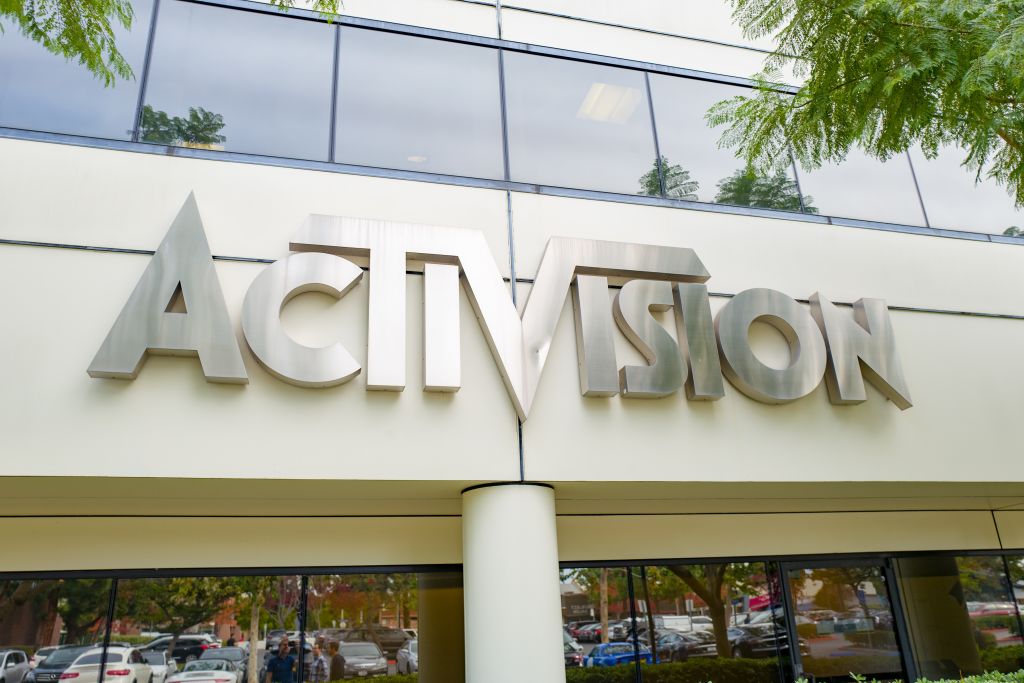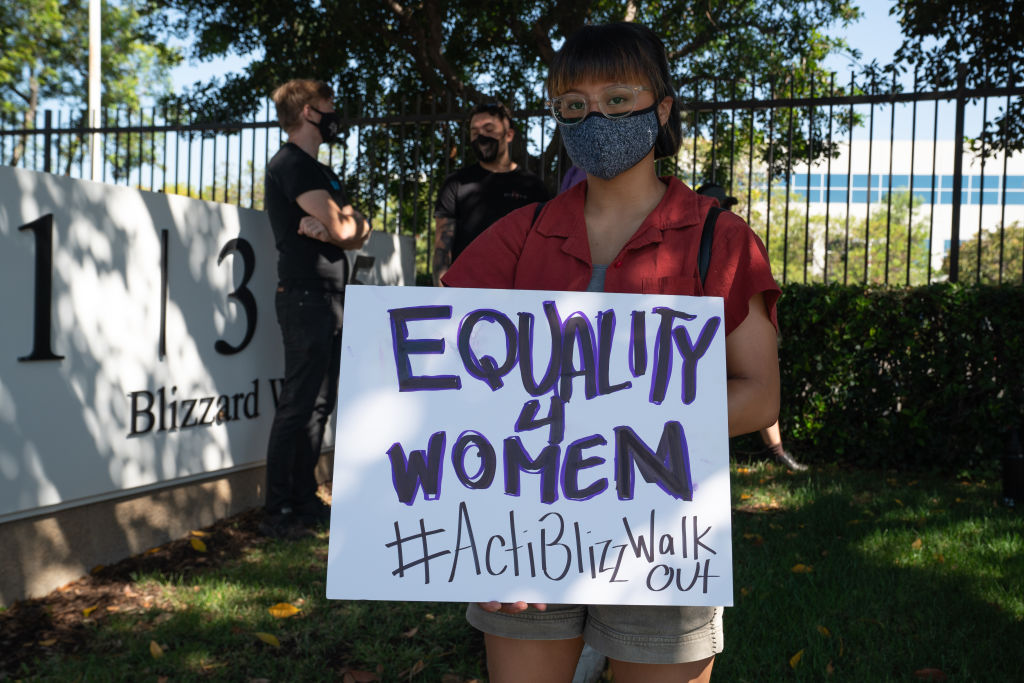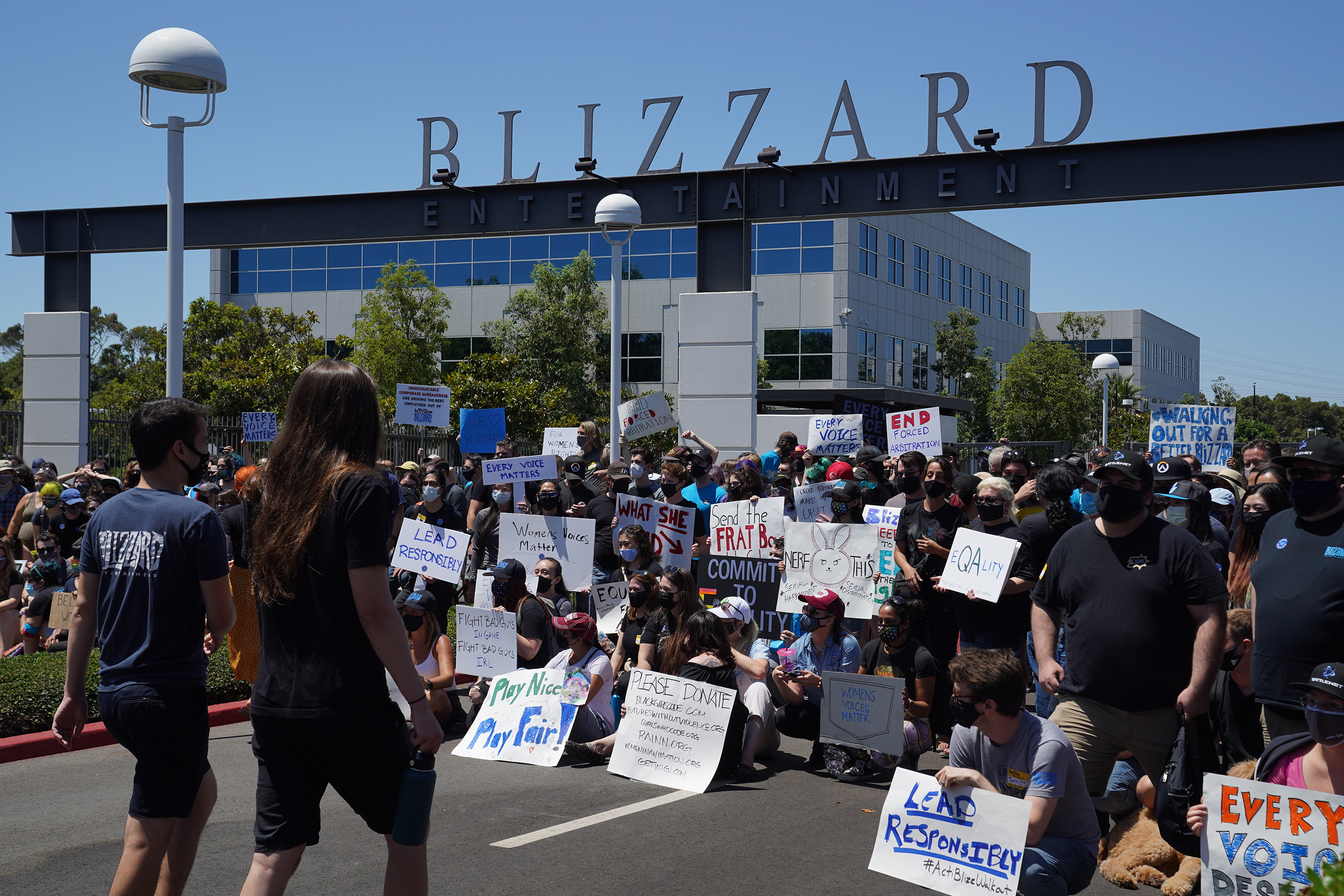Everything that's happened since the Activision Blizzard lawsuit went public
A breakdown of the entire Activision Blizzard story so far, and a lawyer's perspective on what happens next.

On July 20th, California's Department of Fair Employment and Housing filed a lawsuit against Activision Blizzard collecting "numerous complaints about unlawful harassment, discrimination, and retaliation" at the company. Employees the DFEH spoke to said Activision Blizzard has a "frat boy" culture that's been a "breeding ground for harassment and discrimination against women." In the week since, more than 3,000 Activision Blizzard employees have signed an open letter to management speaking up for victims and making a call for "official statements that recognize the seriousness of the allegations and demonstrate compassion for victims of harassment and assault."
It's been a dramatic period for Activision Blizzard, including a response plan from CEO Bobby Kotick and a work stoppage by hundreds of employees. And this is just the beginning: Court proceedings are still pending and could last for months or years if the case goes to trial.
Here's the latest from the Activision Blizzard controversy, a timeline of events since the lawsuit was made public—updated through November 16—and a lawyer's take on what might happen next.
The big stories right now
The latest Activision Blizzard news
- November 16: Activision employees stage a walkout demanding Bobby Kotick's resignation following a report with new allegations.
- November 2: Blizzard co-head Jen Oneal steps down just 3 months after taking the job.
- October 28: Activision CEO Bobby Kotick announces a personal pay cut to $62,500 in total compensation for the year.
- September 21: Overwatch 2 executive producer Chacko Sonny leaves Blizzard.
Everything so far

The Activision Blizzard controversy timeline
Everything that's happened so far, starting with the most recent events.
November 16: A Wall Street Journal report is published including more details about harassment, discrimination, and intimidation within Activision. The report includes information about a CEO Bobby Kotick personally intervening in a sexual harassment investigation within the company. It also details an incident from 2006 in which Kotick made a death threat to his assistant.
Activision Blizzard employees staged a walkout following the report. They have also signed a petition with over 700 signatures and counting demanding Kotick be removed.
November 2: Blizzard co-head Jen Oneal steps down just 3 months after taking the job. It was later revealed in November that Oneal was paid less than her co-lead Mike Ybarra prior to resigning. She also reported to Activision Blizzard's legal department that she had been sexually harassed at the company, saying "I have been tokenized, marginalized, and discriminated against."
The biggest gaming news, reviews and hardware deals
Keep up to date with the most important stories and the best deals, as picked by the PC Gamer team.
October 28: Activision CEO Bobby Kotick announces a personal pay cut in total compensation to $62,500 for the year.
In a press release on the same day, Activision Blizzard addresses additional efforts towards employee demands including waiving mandatory arbitration for sexual harassment and discrimination claims. The publisher said it wants to increase the percentage of workers who identify as women or non-binary by 50%, in part by investing $250 million into game and tech diversity initiatives.
September 21: Activision Blizzard publishes a press release titled "Update on workplace initiatives" that states "we continue to work in good faith with regulators to address and resolve past workplace issues, we also continue to move ahead with our own initiatives to ensure that we are the very best place to work. We remain committed to addressing all workplace issues in a forthright and prompt manner."
Bloomberg also reports that "well-respected" Overwatch 2 executive producer Chacko Sonny told Blizzard developers he's leaving the company on Friday.
September 20: The Wall Street Journal reports that the US Securities and Exchange Commission is investigating Activision Blizzard's handling of employee complaints of sexual misconduct and discrimination. The SEC has subpoenaed executives, including CEO Bobby Kotick. Activision Blizzard confirmed to PC Gamer that "the U.S. Securities and Exchange Commission is conducting an investigation concerning the Company’s disclosures regarding employment matters and related issues."
September 17: Blizzard's chief legal officer departs the company after three years.
September 14: Activision Blizzard employees and an organization called the Communication Workers of America file an unfair labor practice suit with the National Labor Relations Board, alleging that Blizzard told employees they cannot talk about "wages, hours, and working conditions" or related investigations, and also "threatened or disciplined employees on account of protected concerted activity."
August 26: After his namesake left the company, Blizzard decided to rename McCree in Overwatch. The decision came about a month after Blizzard announced plans to remove references to former creative director Alex Afrasiabi, who was directly named in the lawsuit. Blizzard also committed to no longer naming characters after real life people. "We will be more thoughtful and discerning about adding real world references in future Overwatch content," the developer said.
August 11: Three long-time members of Blizzard Entertainment leadership depart the company. Diablo 4 game director Louis Barriga, lead level designer Jesse McCree, and World of Warcraft designer Jonathan LeCraft have all parted with Blizzard, Activision confirms.
August 6: Bloomberg publishes a report revealing additional details about the "frat boy" work culture and "rock-star" mentality present throughout Blizzard's history after its success with World of Warcraft. Current and former employees shared stories including the prevalent culture of drinking, hazing, and sexual harassment. According to the report, Activision's oversight only exacerbated issues with budget cuts, tight deadlines, and additional stress.
Tuesday, August 3: Blizzard president J. Allen Brack leaves his position as head of the studio. He's replaced by a pair of co-leaders, Jen Oneal and Mike Ybarra. Oneal joined Blizzard early in 2021 after five years as the studio head of Vicarious Visions, which merged with Blizzard in January. Ybarra has served as Blizzard's executive vice president of platform and technology since November 2019.
Bloomberg breaks the news that Blizzard's head of HR, Jesse Meschuk, is also no longer with the company.
Employees release a statement rejecting Activision Blizzard's choice of law firm, WilmerHale, to review its policies and procedures, stating that it "has a history of discouraging workers' rights and collective action."
During Activision Blizzard's quarterly earnings call, CEO Bobby Kotick states there's no room for harassment at the company, saying "people will be held accountable for their actions." After the call, Blizzard employees point out on social media that Activision Blizzard has yet to acknowledge any of the demands put forth before their walkout, on July 27.
Monday, August 2: T-Mobile branding is removed from the Overwatch League and Call of Duty League websites. There's no comment on whether the change relates to the lawsuit.
Sunday, August 1: Activision Blizzard executive Fran Townsend causes more controversy by tweeting an article titled "The Problem with Whistleblowing" and later blocking employees on Twitter.
Friday, July 30: Vice publishes an article about Blizzard recruiters at a 2015 hacker conference harassing a security researcher who asked about a penetration testing (cybersecurity auditing) position. "One of them asked me when was the last time I was personally penetrated, if I liked being penetrated, and how often I got penetrated," she said.
On the same day, Waypoint writes about an Activision Blizzard IT worker at the company's Minnesota office who installed spy cameras in the unisex bathroom. He pleaded guilty in 2018 to "interference with privacy."
IGN also publishes a report based on interviews with seven current and former employees who speak to a number of issues, including women being evaluated differently than men inside Blizzard and breastfeeding rooms not having locks, at one point. One employee characterized the company's attempts to fix its culture as "putting lipstick on it."
Thursday, July 29: The New York Times publishes an investigation into Activision Blizzard with newly public accounts of sexual harassment and discrimination. An employee who worked at the company from 2014 to 2017 said she was paid less than her boyfriend, who joined the company at the same time doing the same work, and that a manager messaged her on Facebook asking what kind of porn she watched.
Another woman, who joined Activision in 2011 as a vice president, said that an executive "pressured her to have sex with him because she 'deserved to have some fun' after her boyfriend had died weeks earlier."
Wednesday, July 28: Employees hold a walkout at Blizzard HQ, while others participate in the work stoppage remotely. Employees also respond to CEO Bobby Kotick's letter saying they are "pleased to see that our collective voices… have convinced leadership to change the tone of their communications," but that Kotick "fails to address critical elements at the heart of employee concerns." The response reiterates the four demands from Tuesday. "Today's walkout will demonstrate that this is not a one-time event that our leaders can ignore. We will not return to silence; we will not be placated by the same processes that led us to this point," the letter says.
Game developers across the industry share messages of solidarity with the walkout.
Kotaku publishes a report on Blizzard's "Cosby Suite," a recurring convention party room that Afrasiabi and other employees texted about bringing "hot chixx" to. Greg Street, a former World of Warcraft lead systems designer and current VP of MMO R&D at Riot, who is seen in a photo, claims that the hotel room was "a green room at Blizzcon that many of us at the time used to take a break and relax during the convention" and that "hot chixx" was a joke.
Activision Blizzard confirms to Kotaku that Alex Afrasiabi was terminated in 2020 "for his misconduct in his treatment of other employees."

Tuesday, July 27: The World of Warcraft team announces that it plans to remove references from WoW that are "not appropriate," likely including NPCs and items related to Alex Afrasiabi.
Employees state they plan to walk out on Wednesday to protest the company's response to the lawsuit. The open letter passes 3,000 signatories (Activision Blizzard has approximately 9,500 employees). The plans for the work stoppage come with four demands:
- An end to mandatory arbitration in employee contracts
- More diverse recruiting and hiring practices
- Publication of compensation data, promotion rates and salary ranges
- A company-wide Diversity, Equity & Inclusion task force empowered to hire a third party company to audit Activision Blizzard
Late Tuesday afternoon, CEO Bobby Kotick writes a public note to employees calling the company's initial response "tone deaf," and says "We are taking swift action to be the compassionate, caring company you came to work for and to ensure a safe environment. There is no place anywhere at our company for discrimination, harassment, or unequal treatment of any kind."
Kotick's letter announces immediate steps to investigate claims, hold listening sessions, make personnel changes, enforce diverse hiring practices and change inappropriate in-game content.
"Anyone found to have impeded the integrity of our processes for evaluating claims and imposing appropriate consequences will be terminated."
Monday, July 26: Activision holds an "all-hands" meeting that only has room for 500 staff. Executive Joshua Taub reportedly attempts to address the lawsuit, saying that there's "zero tolerance" for the behavior described in the lawsuit, and that Activision Blizzard works with employees and the accused to "work on a resolution." Taub also says that Fran Townsend's response "wasn't the right communication."
More than 1,000 current and former Activision Blizzard employees sign an open letter to management calling Townsend's statement "abhorrent and insulting to all that we believe our company should stand for." The employee statement continues "Our values as employees are not accurately reflected in the words and actions of our leadership… Categorizing the claims that have been made as 'distorted, and in many cases false' creates a company atmosphere that disbelieves victims… Immediate corrections are needed from the highest level of our organization."
The letter ends with a statement that the employees "stand with all our friends, teammates, and colleagues, as well as the members of our dedicated community, who have experienced mistreatment or harassment of any kind."
Signatures from current and former continue to roll in.
Saturday, July 24: Former Blizzard senior vice president Chris Metzen tweets a response to the lawsuit, beginning with "We failed, and I'm sorry."
Friday July 23: Activision Blizzard chief compliance officer Fran Townsend sends a very different message to staff, calling the lawsuit's depiction of AB "distorted and untrue" and that Activision Blizzard "truly values equality and fairness." Townsend says that when she joined the executive leadership team in March 2021 she was certain she "was joining a company where I would be valued, treated with respect ,and provided opportunities equal to those afforded to the men of the company." Townsend reiterates the initial response that the lawsuit's claims were inaccurate.
Blizzard co-founder and former president Mike Morhaime publishes "My thoughts," stating "I wanted to acknowledge the women who had awful experiences. I hear you, I believe you, and I am so sorry to have let you down."
A video from BlizzCon 2010 goes viral on Twitter. During a WoW panel Q&A, a woman asks about the possibility of less sexualized female characters. The panelists, including Alex Afrasiabi and now-president J. Allen Brack, laugh and make jokes in response.
Thursday, July 22: Blizzard president J. Allen Brack emails staff to say that the behavior detailed in the suit is "completely unacceptable." Activision president Rob Kostich emails staff calling the allegations "deeply disturbing" and says that "we, as a company, take every allegation seriously."
Wednesday, July 21: News breaks that the lawsuit has been filed. In a statement sent to PC Gamer and other press outlets, an Activision Blizzard spokesperson said that the lawsuit includes "distorted, and in many cases false, descriptions of Blizzard's past" and that the DFEH was "required by law to adequately investigate and to have good faith discussions with us to better understand and to resolve any claims or concerns before going to litigation, but they failed to do so. Instead, they rushed to file an inaccurate complaint, as we will demonstrate in court."
Tuesday, July 20: California Department of Fair Employment and Housing files a lawsuit against Activision Blizzard alleging discrimination and sexual harassment against women in the workplace. The lawsuit mentions "cube crawls" in which drunk male employees subjected women to unwanted advances; a lack of women in leadership positions; unequal pay for women; and a lack of action from HR around many of these complaints. The suit also specifically calls out the actions of former WoW senior creative director Alex Afrasiabi, who was "permitted to engage in blatant sexual harassment with little to no repurcussions."
What happens next?

What should we expect from the lawsuit itself?
The Department of Fair Employment and Housing's lawsuit has started a public maelstrom for Activision, but a court hearing could be weeks or months off—if the case goes to a trial at all.
"I don’t see either case as going to an actual trial," lawyer Kellen Voyer tells PC Gamer, referring to the DFEH's case against Activision Blizzard as well as one it filed against Riot Games. "Typically the parties will settle out once the defendant has a better idea of the evidence being brought by the state and the strength of its case. The current negative press… is another reason why the companies will not want to go through a long, public trial."
The DFEH's news page shows a number of settlements from the past three years to resolve discrimination and harassment cases, for sums ranging from $50,000 to $6.2 million. Voyer points out that a sexual harassment case brought by the state is stronger than a case from an individual, partially becasue it's public rather than private arbitration. (Ending mandatory arbitration in Activision Blizzard contracts is one of the demands listed by employees who participated in the July 28 work stoppage.)
Because the DFEH's investigation into Activision Blizzard must have been ongoing for some time, Voyer says the lawsuit is a way to publicly push Activision Blizzard into a settlement. The DFEH filing does request a jury trial, but this is standard practice and doesn't rule out the likely possibility of a settlement before trial begins.

"Activision Blizzard will fight tooth and nail to avoid [a trial] as I would expect a jury (especially in California) to come down hard on the company," Voyer says. " A settlement is likely before it gets to that stage."
Going after a company as big as Activision Blizzard gives the DFEH a chance to make a public spectacle; even if it doesn't have strong enough evidence to push the company into a multi-million dollar settlement, it could have significant ramifications.
"To make an example of a company, even through the filing of the case and the negative PR that results for the company, will hopefully effectuate change through deterrence: by putting companies on notice that there are real, material, ramifications for failing to address toxic culture," Voyer says.
It's still possible that this case goes to trial. If it does, the DFEH will likely be pushing for big monetary penalties and for Activision Blizzard to open itself up to oversight as it enacts plans to repair its workplace issues.
If Blizzard won at trial, it would likely push for no monetary damages and, in Voyer's words, "the usual corporate, general promise of 'we will change and do better.'"

Wes has been covering games and hardware for more than 10 years, first at tech sites like The Wirecutter and Tested before joining the PC Gamer team in 2014. Wes plays a little bit of everything, but he'll always jump at the chance to cover emulation and Japanese games.
When he's not obsessively optimizing and re-optimizing a tangle of conveyor belts in Satisfactory (it's really becoming a problem), he's probably playing a 20-year-old Final Fantasy or some opaque ASCII roguelike. With a focus on writing and editing features, he seeks out personal stories and in-depth histories from the corners of PC gaming and its niche communities. 50% pizza by volume (deep dish, to be specific).

